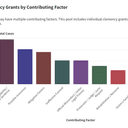
Colorado recently set an execution date in August for Nathan Dunlap, who has been convicted of multiple murders. This would be first execution in the state in 16 years. In an editorial, the Aurora Sentinel recommended that the governor spare his life, not because of doubts about his guilt, but because of doubts about other aspects of the process that led to his death sentence: “There is simply too much doubt about the effectiveness of the death penalty. There is too much doubt about whether Dunlap drew the sentence because of his race. There is too much doubt about whether Colorado residents have grown to see how barbaric and expensive it is. There is too much doubt about whether Dunlap’s circumstances, rather than his crimes, brought on a death sentence.” The editors concluded an execution would be a step in the wrong direction for Colorado: “To move forward on this case with so much in doubt would only add another tragic crime to those that Dunlap has wrought upon all of us.” Read the editorial below.
EDITORIAL: DUNLAP’S DEATH SENTENCE CAN’T LURK IN THE SHADOWS OF DOUBT
There is little doubt that anyone who so coldly murders others deserves to die. There are, however, serious doubts about whether we “deserve” to kill Dunlap.
It’s about doubt. Critical to the American justice system is that in order to ensure fairness, there can be no doubt among jurors as to the guilt of a suspect, the details of the crime and the particulars of a sentence.
In the 20 years since Nathan Dunlap walked into the Chuck E. Cheese restaurant in central Aurora and viciously shot and killed four innocent people, there is no doubt he committed the murders. The case has been scrutinized for almost two decades, and never once was there any question that Dunlap coldly killed people who had nothing to do with him.
After exhausting almost every way to stop his death sentence, Dunlap’s execution has been set for August. His fate now lies with Gov. John Hickenlooper as Dunlap’s lawyers plead for clemency.
There is little doubt that anyone who so coldly murders others deserves to die. There are, however, serious doubts about whether we “deserve” to kill Dunlap.
Despite the endless and excruciating pain Dunlap caused an exponential number of Aurora victims, none of those dead or wounded, none of those devastated by the deaths of loved ones will be made whole by Dunlap’s death. As much as we, and so many, wish that we could trade the lives of murderers for the murdered, it’s not so. We are not made safer as a community by executing murderers instead of locking them up for all their lives. Nothing we can do to murderers can ever repay or even mitigate the loss of victims. Exhaustive studies have shown repeatedly that the death penalty does not deter murderers from acting. If it were true, places like Texas would be free from homicides. The death penalty is about revenge, and revenge is not justice.
That very argument — along with the reality that Colorado’s death penalty costs taxpayers tens of millions of dollars, tortures the families of victims, and is in reality never carried out — has pushed a growing majority of residents to believe that it’s time to end capital punishment in Colorado. The Centennial State is poised to become the sixth in the United States to abolish the death penalty, joining almost every other western democracy. It’s entirely likely that just months after Dunlap is executed, state lawmakers or voters will end the death penalty in the state for good.
But set that aside and consider that besides the critical requirement of “without a doubt,” our justice system is about fairness and equity. Dunlap’s seat on death row belies that fairness. Sadly, the state is all too familiar with tragic murders. But when looking at the nearly 20 most-egregious recent murder cases in Colorado, those three convicts landing on death row come only from Aurora, and are black, including Dunlap.
Undisputed studies in Colorado, and across the country, show that a wildly disproportionate number of minorities get death sentences for crimes that are no more heinous than those committed by whites. It’s almost certain that had Dunlap carried out his murderous rampage in Denver or Northglenn, he would have been sent to prison for the rest of his life, not to end his life. In fact, giving the marked change in demographics in Aurora over the past 20 years, there’s plenty of doubt prosecutors would have succeeded in getting a death sentence against Dunlap. That’s anything but fair or just. It shows how arbitrary capital punishment can be, even in a state as progressive and thoughtful as Colorado.
There is simply too much doubt about the effectiveness of the death penalty. There is too much doubt about whether Dunlap drew the sentence because of his race. There is too much doubt about whether Colorado residents have grown to see how barbaric and expensive it is. There is too much doubt about whether Dunlap’s circumstances, rather than his crimes, brought on a death sentence.
We beseech Hickenlooper and all Aurora residents to work to set aside Dunlap’s imminent execution and instead commit him to spend the rest of his life in prison. If not permanently, a stay of execution should be granted until lawmakers and voters have settled where Colorado voters are on the complicated issue of capital punishment.
To move forward on this case with so much in doubt would only add another tragic crime to those that Dunlap has wrought upon all of us.
(“Dunlap’s Death Sentence Can’t Lurk in the Shadows of Doubt,” Aurora Sentinel, editorial, May 9, 2013). Read more Editorials about the death penalty.



